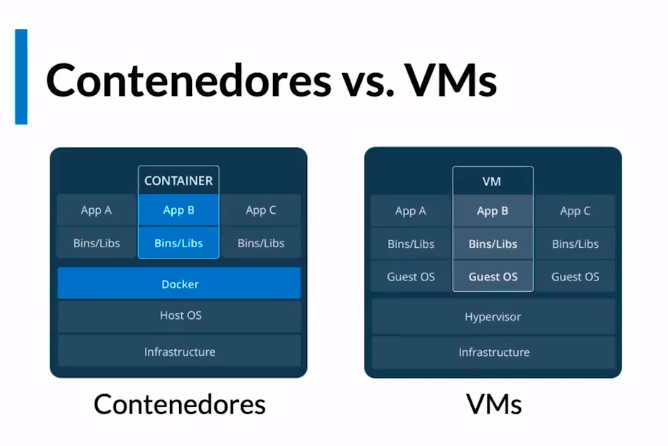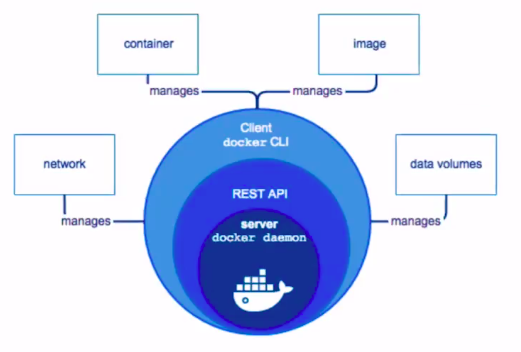The images provided here are from the docker course at Platzi
"Docker allows to build, distribute and executer any application anywhere" (Official documentation)
Docker allows us to solve the following problems:
- Development environment
- Dependencies
- Running environment
- Productive environment
- external services
- Distribution
- Repositories divergency
- Artifacts divergency
- Versions
- Executing the software
- Resources (Hardware)
Virtualization is the creation of a virtual (rather than actual) version of something, such as an operating system, a server, a storage device or network resources.
"Virtualization uses software to create an abstraction layer over computer hardware that allows the hardware elements of a single computer, processors, memory, storage and more to be divided into multiple virtual computers" (IBM) "Each virtual device is represented within its software and user environments as an actual, standalone entity". (Clinton D, 2017)
- Virtual machine
- Emulates a complete computer system
- Runs a complete operating system
- Requires a lot of resources
- Slow
- Heavy
- Hard to maintain
- Docker
- Emulates a process
- Runs a single process
- Requires a few resources
- Fast
- Light
- Easy to maintain
A container is a standard unit of software that packages up code and all its dependencies so the application runs quickly and reliably from one computing environment to another.
Logic agrupation - whit limitations of access to resources. Advantages of containers:
docker info
docker versiondocker run hello-world
docker ps
docker ps -a # all container regardless it is off
docker inspect {container_id/name}
docker run --name {container_name} {image_name}
docker rm {container_id/name}
docker rm $(docker ps -a -q) # remove all containers
docker container prune # all stopped containersdocker run ubuntu
docker run -it ubuntu # keeps the process active
docker run -it --name {container_name} ubuntuIs the main process running? If not, the container will stop.
docker run --name {container_name} -d image_name tail -f /dev/null
docker exec -it {container_name} bash
docker inspect --format '{{.State.Pid}}' container_name
kill process_iddocker run --name {container_name} -d -p 8080:80 nginx # {machine_port:container_port}
docker logs container_name
docker logs -f container_name # follow logsdocker run -d --name {db} mongo
docker exec -it {db} bash
mongo
show dbsdocker run -d --name {app} -p 8080:80 -v {path_to_app}:/usr/share/nginx/html nginxDocker is the only that can control the info in the volume
docker volume ls
docker volume create {volume_name}
docker volume inspect {volume_name}
docker run -d --name {app} --mount src={volume_name},dst=/data/db mongo # that's in the case of being using a mongo imagedocker cp {file_path} {container_name}:{path_to_file_in_the_container}docker cp {container_image}:{route_in_the_container} {route_in_the_machine}Templates.
docker images ls
docker images ls -a
docker pull image_name
docker rmi image_name
docker rmi $(docker images -a -q) # remove all images
docker image prune # all unused imagesFROM ubuntu: 22.04
RUN apt update && apt install -y nginx
CMD ["nginx", "-g", "daemon off;"]docker build -t {image_name} . # . => build context
docker run -d --name {container_name} -p 8080:80 {image_name}docker login
docker tag {image_name}:{tag} {user_name}/{image_name} # changing the name
docker push {user_name}/{image_name}docker history {image_name}docker network ls
docker network inspect {network_name}
docker network create --attachable {network_name}
docker network connect {network_name} {container_name}
docker run -d --name {container_name} --network {network_name} {image_name}
docker run -d --name {container_name} --network {network_name} --network-alias {alias} {image_name}
docker run -d --name {container_name} --network {network_name} --network-alias {alias} -p 8080:80 {image_name}Docker Compose is a tool for defining and running multi-container Docker applications.
version: '3'
services:
db:
image: mongo
volumes:
- dbdata:/data/db
app:
build: .
environment: "route"
ports:
- "8080:80"
depends_on:
- db
volumes:
- .:/usr/share/nginx/html
- /route/
command:
- nginx
- -g
- daemon off;
docker-compose up -d
docker-compose down
docker-compose ps
docker-compose logs
docker-compose logs -f
docker-compose logs -f {service_name}
docker-compose exec {service_name} bash
docker-compose exec {service_name} mongo
docker-compose exec {service_name} mongo -u {user} -p {password} --authenticationDatabase {database}
docker-compose build {service_name}This file allows you override specifications inn the dockerfile
# docker-compose.override.yml
version: '3'
services:
app:
environment:
- route
command:
- nginx
- -g
- daemon off;
docker container prune
docker rm -f $(docker ps -aq)
docker image prune
docker volume prune
docker system prunedocker run -d --name {container_name} --memory 1gb {image_name}
docker statsExec Form
CMD ["nginx", "-g", "daemon off;"] # the command runs directlyShell Form
CMD nginx -g "daemon off;" # the command runs as a child of shelldocker stop {container_name}
docker ps -l
docker kill {container_name}
docker exec {container_name} ps -ef # see the process running in the container
docker exec {container_name} kill {process_id}FROM ubuntu:trusty
ENTRYPOINT ["echo"]
CMD ["Hello World"]docker run {image_name} # Hello World
docker run {image_name} "Hello Platzi" # Hello PlatziFROM ubuntu:trusty
ENTRYPOINT ["/bin/ping", "-c", "3"]
CMD ["localhost"]docker run {image_name} # localhost
docker run {image_name} "google.com" # google.comnode_modules
npm-debug.log
build folder
- development.Dockerfile
- production.Dockerfile
# development.Dockerfile
FROM node:12
COPY ["package.json", "package-lock.json", "/usr/src/"]
WORKDIR /usr/src
RUN npm install
COPY [".", "/usr/src/"]
EXPOSE 3000
CMD ["npx", "nodemon", "index.js"]# production.Dockerfile
FROM node:12 as builder
COPY ["package.json", "package-lock.json", "/usr/src/"]
WORKDIR /usr/src
RUN npm install --only=production
COPY [".", "/usr/src/"]
RUN npm install --only=development
RUN npm run test
# Productive image
FROM node:12
COPY ["package.json", "package-lock.json", "/usr/src/"]
WORKDIR /usr/src
RUN npm install --only=production
COPY --from=builder ["/usr/src/index.js", "/usr/src/"]
EXPOSE 3000
CMD ["node", "index.js"]docker build -f development.Dockerfile -t {image_name} .
docker build -f production.Dockerfile -t {image_name} .docker run -d --rm --name {container_name} -v /var/run/docker.sock:/var/run/docker.sock docker:stable-dind
docker exec -it {container_name} sh
docker ps
